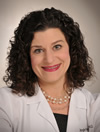In The News
Angie Randazzo, PhD, St. Luke's Hospital

Resolve to limit alcohol to promote healthy sleep
For many people, New Year's Eve includes celebratory alcohol consumption, but few women realize the effects alcohol may have on their sleep in particular. It's important to know the facts before you start celebrating.
Alcohol is a depressant, so it shortens the time it takes to fall asleep and promotes sleep during the first part of the night. However, as alcohol is quickly processed and eliminated from the body at a rate of about one glass of wine or one beer an hour, the body will start to go through withdrawal. This leads to shallow and disrupted sleep and is called a "rebound effect," when the initial physical effects on sleep change in the opposite direction.
If alcohol intake is high, there is also potential for a headache, an upset stomach, a rapid heart rate and sweating (the onset of a hangover), all of which further interrupt sleep.
A recent study in Alcoholism: Clinical & Experimental Research compared men and women with equal breath alcohol concentration and their response to evening alcohol consumption. Both men and women had higher sleepiness ratings at bedtime and fell asleep faster after drinking alcoholic beverages. But, both also had more awakenings, slept less of the time in bed and had worse sleep quality ratings.
Interestingly, women in the study were sleepier at bedtime and had more wakefulness during the night than men. Greater sleep disruption in women may be related to how the female body processes alcohol. For example, other studies have shown that breath alcohol concentration decreases faster in women, so the rebound effect, or wakefulness, may occur earlier during the night.
Sleep is an important part of your overall health. Sleep deprivation makes you more prone to illness, accidents and weight gain. On the other hand, taking care of your sleep needs helps you function better at home and at work. If you think you have a sleep problem, discuss your concerns with your physician. And, of course, when ringing in the New Year, be sure to drink responsibly, and never drink and drive.
Angie Randazzo, PhD, is a clinical psychologist at St. Luke's Sleep Medicine and Research Center. Call 314-205-6030 or visit her Meet the Team page.
This article was published in the St. Louis Post-Dispatch on December 29, 2011.
